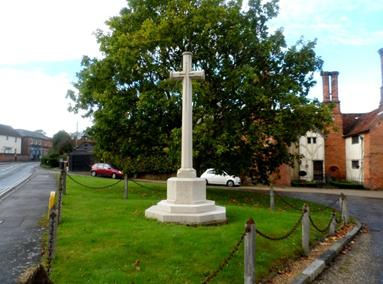
James
SUCKLING
1897 –1918

Early Life
JAMES SUCKLING was born in 1897 in Great Waltham, the youngest of five children, three daughters and two sons, born to James and Hannah Suckling (née Perry).
James and Hannah were married on the 10th April 1880 at the Parish Church, Great Waltham. James, 24 years old, was a Rural Messenger (postman) and they were both born in Little Waltham.
In 1881 the family were living in the village with his father-in-law, George Perry, James employed as a rural postman.In 1891 their address is given as Barrack Road and in 1901, they are living at Wisemans with James now 4 years old.
Hannah died on the 18th February 1911 in the village, aged 52 years and in the 1911 Census, James is a widower, a GPO Postman, with Nellie and James, now aged 14 years and at school, living at Wisemans.
Military Life
James enlisted at Chelmsford and joined the 6th Battalion, (Service Battalion) Bedfordshire Regiment, Regimental No. 35946. The Battalion was raised specifically for the duration of the war in August 1914 as part of K1 – Kitchener’s first call to arms for 100,000 men to fight for their country against the King’s enemies.
The 6th Battalion trained on Salisbury Plains and transferred into the 112th Brigade. On the 21st April 1915, the Division moved to Cholderton on the south east boundary of the Salisbury Plain and continued training in preparation for their entry into the war.
At the end of July, the Battalion boarded trains at Ludgershall Station, 7 miles north-west of Andover, and arrived at Southampton later that afternoon. They left English shores at 6.30pm on board the Empress Queen and landed at 7am at Le Havre in France on the 30th July 1915. Having gathered their supplies, the Division concentrated around St Omer before moving forward to the front line.
Six weeks after landing in France, on the 11th October 1915, the entire 71st Brigade was transferred to the 6th Division, who were a veteran Regular Army Division that had been serving in France since 1914. During another reorganisation on 17th November 1915, the battalion were transferred to the 16th Brigade of the 6th Division. This may account for his transfer to the 8th Battalion.
On the 16th February 1918, in line with a major shakeup of the British Army, the 8th Battalion was disbanded in France and the men were distributed amongst the other battalions in the Regiment.
James then appears to be with the 1st Battalion, Lincolnshire Regiment. On the 12th/13th April, the Regiment were at the Battle of Messines and relieved the 12th/13th Northumberland Fusiliers in the Wytschaete Sector (a mile north of Messines). From that date the battalion was subjected to a continuous bombardment, which was made all the more trying for the men owing to the lack of shelter. Between the evening of the 12th /13th and 15th/16th casualties amounted to 2 Officers and 80 other ranks. The battalion only went into the front line with 12 Officers, including Battalion HQ, so that the strain on these few officers was tremendous. In spite of this the fighting spirit of all ranks was maintained at the highest level.
On the morning of the 16th April the enemy put down a terrific bombardment of the front line, on the village and all approaches. The bombardment lasted for about an hour aimed at the Regiment. Under cover of a dense fog the enemy attacked on the flanks of the Battalion and succeeded in breaking the line. Because of the dense fog it was impossible to assess the closeness of the enemy until they appeared at close quarters. The battalion stood firm and fought to the last.
Death and Memorial
James was killed in action and presumed dead, as his body was never recovered, on the 16th April 1918, aged 21 years old.
He is ‘Remembered with Honour’ at Tyne Cot Memorial.

Panel 35-37 & 162-162A

James is also remembered on the War Memorial in Great Waltham.

UK, Army Registers of Soldiers' Effects, 1901-1929
Alice his sister received the total sum of £8.4s. on the 23rd February 1918 which included a Gratuity payment of £7.

MEDAL CARD JAMES SUCKLING
James’ father was honoured by the King and awarded the Imperial Service Medal ‘in recognition of his zealous and meritorious service as postman from Great Waltham to High Easter, since November 1875.’
He died on the 4th August 1926 and is buried in Great Waltham Churchyard.

CHELMSFORD CHRONICLE 20 JUNE 1913

